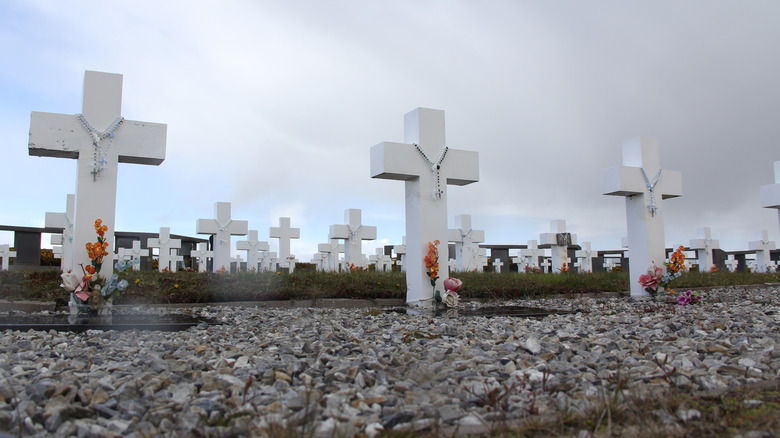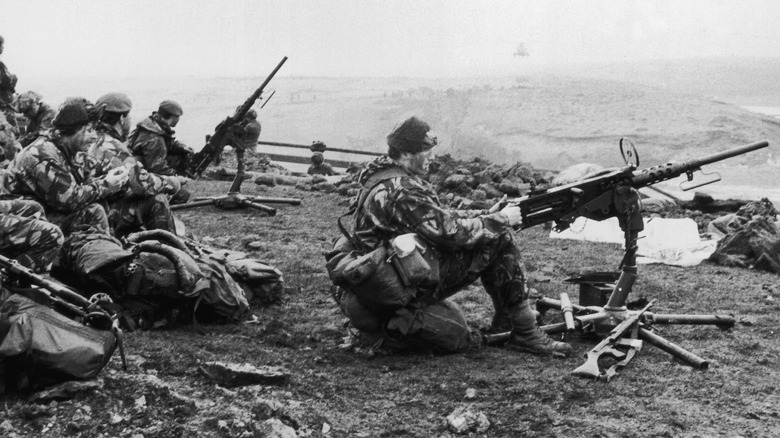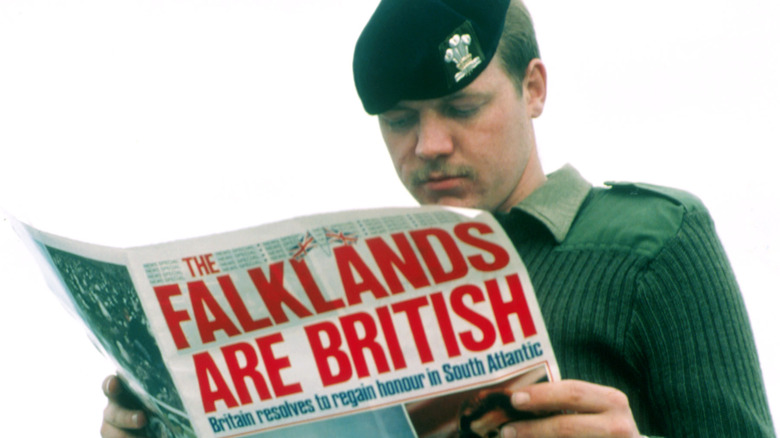Who Won The Falklands War And Why Did It Happen?
The Falklands are a group of islands located near the east coast of Argentina. Prior to the war, the UK had little interest in the Falkland Islands, a British overseas territory with fewer than 2000 residents and lots of sheep located 8000 km away from the UK.
Britain first laid claim to the islands back in 1690, when Captain John Strong stumbled upon the then-uninhabited archipelago. Although the British had a settlement there for a very brief period of time, they eventually relinquished the islands to Spain. According to Smithsonian Magazine, things got a little complicated about a century later, as Argentina claimed it had "inherited" the islands from Spain, which prompted British troops to come over and claim it back. By 1833, the Falklands were an official British colony, much to the anger of the South American nation, which had renamed the islands Las Malvinas and staked a claim over them.
The war was an attempt to hide other struggles
The 1970s and early 1980s were marked by upheaval in Argentina, which was under the control of military dictators. The country was undergoing financial distress and dealing with civil unrest in response to the human right violations that would become known as "the Dirty War" years. By 1981, newly appointed dictator General Leopoldo Galtieri was looking for a way to distract the Argentinian population from their troubles by appealing to their nationalism (per Smithsonian Magazine). Military leaders were sure retaking the islands would instill patriotic feelings in the demoralized population. Plus, they were sure it would all be an easy undertaking, without any British resistance.
Still, nothing happened until the following year, when a series of small incidents fed the tension between the two countries. The most significant one happened near the end of March, when Argentinian merchants raised the country's flag on the island, catching the attention of the Royal Navy patrol vessels.
The war unofficially started on April 2, 1982, as Argentinian forces moved on British outposts on the islands. Within hours, both governments had declared the Falkland Islands a war zone, though neither one officially declared war (per Britannica). Troops from both sides started firing soon after, with Argentina showing a major advantage in the air and the British holding strong in the water.
Things only got worse from there
Armed with missiles, Argentina's superior air force heavily bombed British ships, causing serious damage and keeping troops off the island for weeks. By May 4th, though, the Argentinians had lost almost 30 percent of their planes and British forces took advantage of the weakened forces to make an amphibious landing on Falkland Islands (via Britannica).
Once on land, the British infantry advanced rapidly, cutting off the Argentinian forces from their supply runs. Aware that they could be starved out, Argentinian troops surrendered on June 14. The surrender was basically an admission that the country was just not prepared for the fight. They didn't have the artillery capacity to fight England and what little they had was in the form of smaller-gauge weaponry, according to The Christian Science Monitor.
In addition, the Argentinian army had serious shortages that made the fight difficult for its own soldiers. According to reports from the surviving troops, their soldiers didn't have the proper equipment for the harsh island weather. They also had little food, not enough ammunition supplies, and not even enough toilet paper. Plus, the harsh weather of the islands, coupled with the lack of proper protection, meant many Argentinian soldiers ended up with frostbite. One soldier explained, "When we were issued jungle boots rather than winter boots, I knew we were in trouble."
Official numbers reported by Smithsonian Magazine account for 649 Argentinian army fatalities, 255 British troops fatalities, and 3 Falkland Islanders dying as the result of friendly fire over the course of the undeclared war.


